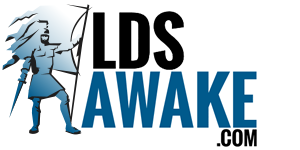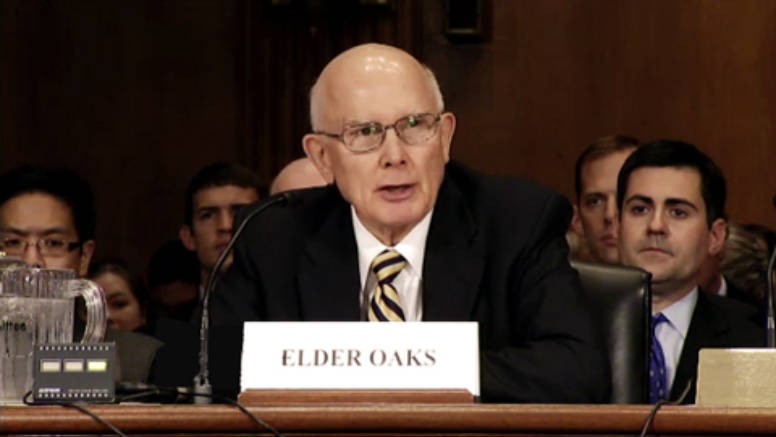Testimony Submitted by Elder Dallin H. Oaks Senate Finance Committee Hearing, October 18, 2011
I am Elder Dallin H. Oaks of the Quorum of the Twelve Apostles of The Church of Jesus Christ of Latter-day Saints.
I appear here to speak not only for churches and their charitable works, but also for the entire private sector, of which our churches and other charitable institutions are only a part.
While I appear here as a religious leader, the possible impairment of the charitable deduction in order to enhance tax revenues is not a religious issue. It is not a political issue. It is not even an economic issue. It poses a question about the nature and future of America.
The charitable deduction is vital to the private sector that is unique to America. Alexis de Tocqueville, one of the most astute observers of our nation in its infancy, wrote:
“The Americans make associations to give entertainment, to found seminaries, to build inns, to construct churches, to diffuse books, to send missionaries to the antipodes; and in this manner they found hospitals, prisons, and schools. If it is proposed to inculcate some truth or to foster some feeling by the encouragement of a great example, they form a society. Wherever at the head of some new undertaking you see the government in France, or a man of rank in England, in the United States you will be sure to find an association.” (Alexis de Tocqueville, Democracy in America, Vol. 2, p. 114 (New York, Vintage Books, 1955))
Today millions of these private “associations”—religious and charitable—are responsible for tens of millions of jobs and innumerable services that benefit our citizens at every level. I speak of private educational institutions, hospitals, social welfare agencies, and innumerable other organizations ministering to the needs of children, youth, the aged, the poor, and citizens generally. The financial well- being of this private sector is dependent upon private contributions that qualify for the charitable deduction. And the impact these private institutions have on those they serve is magnified by the millions of volunteers motivated by the ideals they pursue.
For example, in the aftermath of Katrina and the other 2005 Gulf Coast hurricanes, The Church of Jesus Christ of Latter-day Saints aided the cleanup efforts with almost 3,000 tons of emergency supplies, over $13 million in cash and use of heavy equipment, and its members gave more than 42,000 man-days of service. Other non-profit organizations provided over $3.5 billion in cash and in- kind donations to help with relief efforts. (See Appendix for sources and details.)
Another example concerns the unique role of our nation’s churches, synagogues, and other religious organizations.
John Adams wrote: “Our constitution was made only for a moral and religious people. It is wholly inadequate to the government of any other.” This wise Founding Father explained:
“[We] have no government armed with power capable of contending with human passions unbridled by morality and religion. Avarice, ambition, revenge, or gallantry, would break the strongest cords of our Constitution as a whale goes through a net.” (Charles Francis Adams, The Works of John Adams, Second President of the United States, 228-29 (Books for Libraries Press, 1969))
Our nation is held together not just by law and its enforcement, but by voluntary obedience to the unenforceable and by widespread adherence to norms of right and wrong, such as the vital principle of honesty. For a large proportion of our citizens these essential norms are grounded in the principles of our religious beliefs, taught in our churches and synagogues.
There is no need to provide other examples. Throughout your life, each of you Senators and those you love have personally benefitted from a host of private organizations—some Church-related, but many not.
The private sector of charitable activity is almost unique and surely uniquely valued in America. And we all understand that its activities are funded by private donations produced or importantly stimulated by a charitable deduction that reduces the donor’s taxes.
Some economists and other scholars contend that this is, in effect, a tax expenditure because tax revenues are reduced by the benefit granted. In other words, because the government could have denied the charitable deduction there is a government expenditure in its granting the deduction and forgoing the revenue. By that reasoning the personal income we think is ours is really the government’s because of its choice not to take it away by taxation. That is surely an attitude not shared by most Americans.
Some also assert that reductions in the charitable deduction would not cause charitable organizations to suffer financial losses from decreased private gifts since the government would make up some of these losses by additional appropriations. Again, I submit that most Americans would not have us relinquish the freedom and diversity of our vigorous private sector of charities in exchange for the assurance that the government would select and manage their functions.
We are grateful for charitable deductions, which encourage donations to churches and other charities. The effect of this tax benefit is built into the financing of charitable enterprises that are vital to our nation, and it is a significant and wise support of the private sector. The charitable deduction should remain unimpaired, not just for religions and their unique role but for the benefit of the entire private sector of our nation.
I close with a quote from an 1830 debate in the United States Senate on a matter of great national importance. These words provide an appropriate reminder during the current discussion of the advisability of modifying the charitable deduction. We have heard arguments pro and con, with complex and competing analyses. So it was in Senator Daniel Webster’s day, when he offered this suggestion:
“When the mariner has been tossed for many days in thick weather, and on an unknown sea, he naturally avails himself of the first pause in the storm, the earliest glance of the sun, to take his latitude, and ascertain how far the elements have driven him from his true course. Let us imitate this prudence, and, before we float farther on the waves of this debate, refer to the point from which we departed, that we may at least be able to conjecture where we now are.” (The Works of Daniel Webster, 10th ed., vol. 3, p. 270)
“Where we now are” is midway in a discussion of whether the charitable deduction—so essential to maintaining the private sector of American life—is to be retained intact. That private, non-profit sector has always been an important counterweight to the powers and potentially repressive influence of governments. The private sector is essential to preserving pluralism and freedom in our nation.
In behalf of countless churches and other charities, and in behalf of the tens of millions who are benefited by their services and by the services of the millions of volunteers who are motivated by them, I say, don’t impair the charitable deduction!
Appendix
PRIVATE CHARITABLE RESPONSES TO THE GULF COAST HURRICANES IN 2005
The Church of Jesus Christ of Latter-day Saints
Before Hurricane Katrina hit land, fourteen truckloads of supplies from The Church of Jesus Christ of Latter-day Saints were being moved into position to distribute food, water, and emergency equipment to people in storm devastated areas. Over the next few months, a total of 140 semi-trucks carrying 2,800 tons of donated supplies arrived in the Gulf Coast. Thousands of LDS volunteers, from every state in the Union, spent their own time and money to travel to the coast and help in the cleanup efforts; they donated more than 42,000 man-days of service. Some wielded chainsaws or drove dump trucks, Bobcats, or back hoes, removing heavy debris. Others handed out food and clothing, hygiene kits, generators, tents, sleeping bags, and tarps. Trained social workers and counselors offered their expertise. At least ten meetinghouses were opened to provide temporary housing, and LDS computer programmers set up a system to connect people who needed housing with those offering places to stay. During the next year, members provided the labor to help repair and rebuild 200 homes. Members served however they were needed, as part of an organized army or as individuals providing one-on- one charity. (Records of The Church of Jesus Christ of Latter-day Saints)
Other Faith-Based and Community Organizations and Disaster Relief Agencies
Over $3.5 billion dollars were contributed to relief and recovery operations after the Gulf Coast hurricanes. This number includes $3,378,185,879 cash donations, and $166,624,000 in-kind donations including water, food, drinks, clothing, medical equipment and supplies, housing, transportation, equipment, and volunteer services. For example, Catholic Charities donated over $154,000,000 to relief efforts. The American Red Cross reported $2.1 billion in cash donations for hurricane relief in 2005. Over 200,000 Red Cross volunteers made sure that survivors had a safe place to stay, food, and the means to provide essential items for themselves and their families. They provided more than 3.4 million overnight stays in nearly 1,200 Red Cross shelters, more than 34 million meals and snacks, and emergency financial assistance to more than 4 million people. Hundreds of organizations stepped up to provide funding or manpower to rebuild lives, homes and businesses. (The Center on Philanthropy at Indiana University, “Disaster Giving 2005: Size, Scope, and Effects on the Nonprofit Sector,” Nov. 16, 2006, and spreadsheet published 20 Feb. 2006; The Foundation Center, “Snapshot of Philanthropy’s Response to the Gulf Coast Hurricanes,” Feb. 2006; Congressional Budget Office, “Progress Made: A 6-Month Update on Hurricane Relief, Recovery and Rebuilding,” 28 Feb. 2006)
Original Source
Testimony Submitted by Elder Dallin H. Oaks
Senate Finance Committee Hearing October 18, 2011
http://www.finance.senate.gov/imo/media/doc/Oaks%20Testimony1.pdf
http://www.finance.senate.gov/hearings/tax-reform-options-incentives-for-charitable-giving
Accessed 12/6/2016

